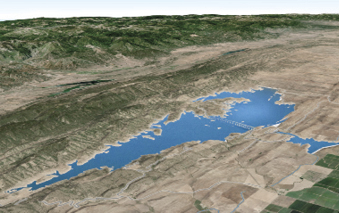February 14, 2022 - By State Senator Shannon Grove, (R-Bakersfield) - Few people in this state would disagree that improving the management of California's water supply  should be a priority.
should be a priority.
Sites Reservoir, shown in this artist rendering, is a major water-storage facility planned for north of Sacramento. It remains stalled, more than seven years after voters approved a state water bond. Photo/California Department of Water Resources
Clean water is vital for our health, the environment and the economy. When people disagree on water issues, it is usually on how to improve water quality. I would argue that better management includes increasing above- and below-ground storage and modernizing conveyance infrastructure.
We must get beyond the extremes of some eco-warriors that a robust system of reservoirs and canals is a no-go. Such long-needed infrastructure is as much a part of the solution as is conservation, technological innovation, and better management of the flows from winter rains and spring snowmelt.
Fortunately, there was significant rain and snow in December. Unfortunately, as that snow melts this spring, we won't have the ability to capture enough runoff to help us get through the longer periods of drought that our state experiences.
We must embrace solutions that take into account all the needs of the state: providing drought resiliency, mitigating wildfires, protecting the environment, maintaining a safe and healthy food supply, and ensuring that communities have the water they need for families and businesses to thrive.
I cosponsored legislation—Senate Bill 559—last year that would have provided up to $785 million to repair key parts of the state's water infrastructure, focusing particularly on repairs to the California Aqueduct and the Friant-Kern, Delta-Mendota and San Luis canals.
To the detriment of drought-stricken communities and farmers up and down the valley, the bill came under attack from environmentalists, who argued it was too favorable to agricultural interests. Such narrow-minded views do little to help anyone.
Ultimately, a series of amendments forced by environmentalists gutted the bill. However, our relentless advocacy still brought in $100 million for vital canal repairs.
Another example of the obstructionism blocking sorely needed water storage and conveyance is the Sites Reservoir, planned for the west Sacramento Valley between Glenn and Colusa counties. In 2014, voters approved funding for the reservoir under the $7.1 billion Proposition 1 water bond.
Even though Proposition 1 was approved by 67% of California voters and was backed by some environmental groups, not a single cent has been spent on actual construction of water-storage facilities.
The California Water Commission recently voted to move forward on Sites, deeming it feasible for construction and eligible to receive bond money. The vote could free up $837 million in funding from the state's Water Storage Investment Program.
Proposition 1 projects must include additional public benefits, and the commission found that the Sites project would "include water deliveries to the Sacramento National Wildlife Refuge Complex and the Yolo Bypass to benefit delta smelt, storage to capture flood flows and increased opportunities for recreation."
Despite all that, some environmental groups spoke in opposition to Sites, arguing it would neither benefit fisheries nor the environment. So much for working together for the common good.
We need to fully fund projects that will repair our aged canals and dams and provide more water storage and conveyance. We can do so by prioritizing and funding water storage and infrastructure projects in the state budget and by cutting regulatory red tape that drags out construction and raises costs.
The fact is we have a massive budget surplus this year. We should spend it on water infrastructure, period.
In early January, Senate Republicans sent a letter to the governor, Senate president pro tem and the Assembly speaker suggesting our priorities for spending the budget surplus, and preparing California for long-term drought was top of the list.
We urged the state to use surplus funds to build the Sites Reservoir and provide water conveyance in critical areas of the state. This would provide water storage and the ability to move that water around more efficiently to help cities, farms and the environment.
Despite a few wet weeks, California is in a near constant state of drought, given our minimal water storage and the potential for reduced snowpack in the future. We must do better in preparing for this more uncertain future by taking advantage of our state's surplus and building the water storage and infrastructure we need.
(State Sen. Shannon Grove, R-Bakersfield, represents California's 16th Senate District, including Kern, Tulare and San Bernardino counties. She may be contacted through her Senate website at https://grove.cssrc.us/.)
ABOUT CALIFORNIA FARM BUREAU FEDERATION
The California Farm Bureau Federation works to protect family farms and ranches on behalf of nearly 32,000 members statewide and as part of a nationwide network of more than 5.5 million Farm Bureau members.
Source: Reprinted with permission CFBF








